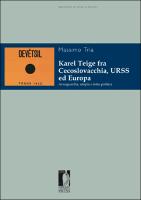Karel Teige fra Cecoslovacchia, URSS ed Europa
Avanguardia, utopia e lotta politica
Abstract
Karel Teige was one of the leading theorists of the Czech avant-garde, and his activity is bound up with the most enriching cultural contributions made to the Czech Republic in the first half of the twentieth century. Proclaiming himself a Marxist, he was frequently at odds with Czech liberal-pragmatic thought. The emergence of European totalitarianism coincided with a major turning-point in his life when, towards the end of the 1930s, he had to come to terms with the Nazi invasion of his country and with the local version of Stalinism. After the War he was marginalised from cultural life and he died of a heart attack while being persecuted in a ferocious campaign of defamation by the Communist Party. The book offers a portrait of this protagonist of European culture and of the process of rediscovery that in the 1960s reintegrated his work and his thought into the extraordinary cultural revival that blossomed in the Prague Spring of 1968.


 Download
Download Web Shop
Web Shop